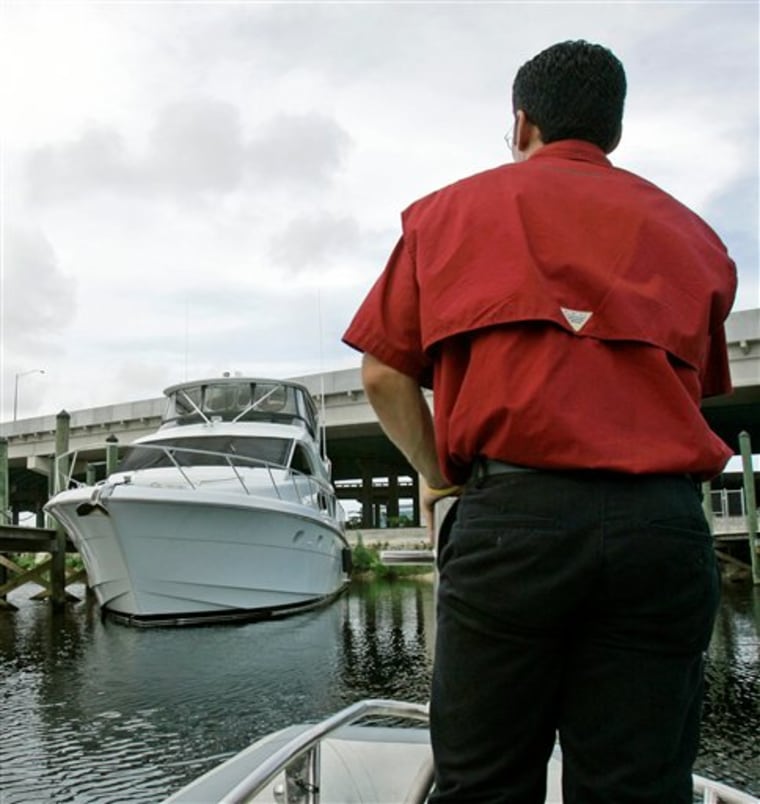In a bad economy, fun is often the first casualty.
For James Hedrick, that means it's a busy time in his line of work. He's one of those dreaded repo men.
He spends his days scanning megayachts, sailboats and fishing skiffs as he steers his dinghy through a marina west of the city's skyscrapers, looking for a piece of the American dream.
This particular piece is a gleaming white, 65-foot Hatteras with two master bedrooms, two full bathrooms and a full galley kitchen with glossy teak cabinets. The owner is $35,000 past due on his $1.5 million boat loan.
Hedrick is an agent with National Liquidators, considered by industry experts to be the world's largest marine repo company. The Fort Lauderdale-based company has tripled its business in the past three years, and now takes possession of about 200 boats a month in Florida, Ohio and California. The company's competitors also say they've seen similar increases in business.
"They're going to hang on to the car, they're going to hang on to the house. But they're going to give up on the boat," said Hedrick, whose employer has doubled its staff in two years to 85 repo agents so they can meet demand from the banks and lenders.
It's not just boats: Repo agents say banks and lenders have been asking them to reclaim all-terrain vehicles, motorcycles, small planes, snowmobiles, semi-trucks and, of, course, cars. Vehicle repossessions were up 10 percent in 2007 over the previous year, said Tom Webb, an analyst for Atlanta-based Manheim, the largest car auction company in the nation.
One boat dealer, whose company also does recovery for banks and lenders, says those facing boat repossession were typically involved in the housing boom either as a real estate agent, construction worker or mortgage broker.
"A lot of this is self-inflicted. It's somebody who three years ago made $50,000 to $60,000 and didn't save a penny," said Ray Jones, the owner of Long Beach Yacht Sales in California. "They thought the income would never end. But the income stopped and the toys went away."
Rising gas prices have also made it harder for owners to make room in their budgets for boat trips. Marine diesel fuel costs more than $5 a gallon in some places, which means a five-hour jaunt on the water can easily cost $250 for some gas-guzzling yachts. Last year's marine diesel cost about $3.40 a gallon.
"For about a year now, it's been good for the repo guy," says Don Mashak, the owner of First National Repossession in Minneapolis.
Overall, the marine industry is hurting. Bankers say new boat loans are declining. MarineMax, the nation's largest boat retailer based in Clearwater, reported in April that sales fell 28 percent for its second quarter.
Because prices for used boats are falling, buyers can buy repossessed boats under 60 feet for as low as 40 percent of what the boat would cost new, said Robert Toney, National Liquidators' president. Boats larger than that are less likely to be repossessed because their wealthy owners are in a better position to weather a slowing economy, Toney said.
Sometimes, owners turn the boats in to the repo agencies when they realize they can no longer pay. But other times, they hide or vandalize the boats before they can be seized, said Megan McQuaide, the owner of Repo Yacht Sales in San Diego. She's boarded boats with oil splashed around the cabin, engines intentionally overheated and feces on the deck.
"Sometimes it's really malicious stuff," she said.
On a recent June afternoon, Hedrick finds no such surprises aboard the 65-foot Hatteras. He and his assistant board the yacht to take photos and catalog any personal items. There aren't many aboard, and the boat is unusually clean, save for a six-pack of Diet Coke and a children's video in one of the VCRs.
Occasionally, he finds the remnants of parties: bikinis, champagne bottles and even drugs. He calls police if he comes across anything illegal.
Most of all, he tries to avoid confrontations. He carries a sharp knife on his belt to swiftly cut dock lines and a company credit card in his wallet in case he needs to pay past-due dock fees. If the owner shows up, Hedrick will politely leave and let lawyers, lenders and the boat owner sort it out.
"I'm not 'Dog the Bounty Hunter,'" says Hedrick. "We get paid not to have trouble. But does it bother me sometimes? You bet."
